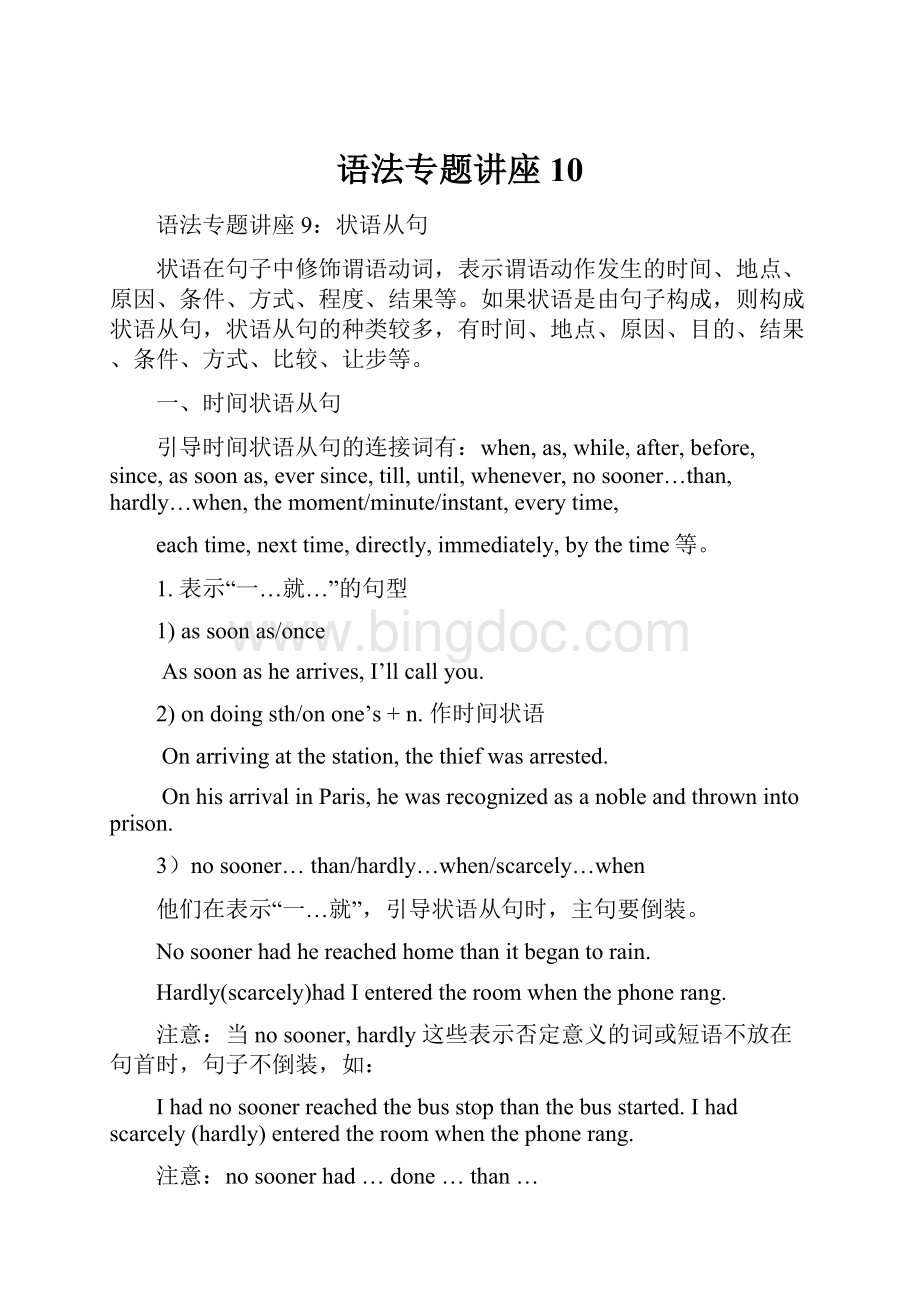语法专题讲座10Word文档格式.docx
《语法专题讲座10Word文档格式.docx》由会员分享,可在线阅读,更多相关《语法专题讲座10Word文档格式.docx(32页珍藏版)》请在冰点文库上搜索。

4)themoment,theinstant,theminute,thesecond
Themomentissawhim,Irecognizedhim.
We’llleavetheminuteyouareready.
5)有些副词如:
instantly,immediately,directly可用作连词,后接从句。
Ileftimmediatelytheclockstruck5.
2.由bythetime引导的时间状语从句。
注意时态的变化:
在一般情况下,如果从句的谓语动词用一般过去时,主句的谓语动词用过去完成时;
如果主句的谓语动词用一般现在时,主句的谓语动词用将来完成时。
例如:
Bythetimeyoucameback,Ihadfinishedthisbook.
Bythetimeyoucomeheretomorrow,Iwillhavefinishedthiswork.
3.由eachtime,everytime,nexttime,thefirsttime,thelasttime,anytime等名词短语引导的时间状语从句,表示“每次,每当;
下次,第一次,最后一次,任何时候。
。
”
EachtimehecametoHarbin,hewouldcallonme.。
YougrowyoungereverytimeIseeyou.
Nexttimeyoucome,doremembertobringyoursonhere.
ThelasttimeshesawJames,hewaslyinginbed.
ThefirsttimeIclimbedontothewall,Ifeltnervous.
Youarewelcometocomebackanytimeyouwantto.
4.whenever引导的时间状语从句。
Wheneverthatmansays“Totellthetruth”,Isuspectthathe'
sabouttotellalie.
5.When,while,as引导的时间状语从句
When:
1)When引导的从句的谓语动词可以是延续性的动词,又可以是瞬时动词。
表示主句的动作和从句的动作同时发生,或从句的动作在主句之前发生。
Whenshecamein,Iwaseating.(瞬时动词)
WhenIreceivetheletter,I’lltellyou.
WhenIlivedinthecountryside,Iusedtocarrysomewaterforhim.
2)when有时表示“就在那时”。
Wewereabouttoleavewhenhecamein.
Beabouttodo…when;
bedoing…when;
beonone’sway…when;
haddone…when..;
beonthepointofdoing…when….
While:
1)While引导的从句表示“在。
过程中”,强调某一时间内主句和从句的动作在同时发生。
从句的谓语动词表示较长时间,因此必须是延续性动词。
Whiletheyweredoinghomework,someonebrokeintothehouse.
Whilehewasstillateenager,hewasabigstar.
MymotherwascookingwhileIwasdoingmyhomework.
Whilemywifewasreadingthenewspaper,IwaswatchingTV.
2)while除了可用作从属连词之外还可用作并列连词,表示对比关系”然而”。
Ilikeplayingfootballwhileyoulikeplayingbasketball.
As:
1)As表示“一边……一边”,as引导的动作是延续性的动作,一般用于主句和从句动作同时发生.;
如:
Wealwayssingaswewalk.我们总是边走边唱。
(as表示“一边……一边”)
Aswewalked,wetalked.
2)as还可说明两种正发展或变化的情况,译为“随着”,表时间的推移.
AsIgetolder,Igetmoreoptimistic.
Ashegrewolder,hebegantogodeaf.
3)as也可以强调一先一后二个动作紧接着发生.表示“当。
时”。
例
Aswewasgoingout,itbegantosnow.
4)有时引起一个名词,这时它相当一个时间状语从句.
Asaboy(whenhewasaboy),hewasgoodatmaths.
用When,while,as填空:
(1)______Iwaswalkingdownthestreet,Inoticedapolicecarinfrontofthestore.
(2)________Johnarrived,Iwascookinglunch.
(3)_________hegrewolder,helostinterestineverythingexceptgardening.
(4)Howcanhegetgoodgrades_______hewon’tstudy?
(5)Iwaswanderingthroughthestreet_____Icaughtsightofatailor’sshop.
(6)______thegrandparentslovethechildren,theyarestrictwiththem.
6.由before引导的时间状语从句
1)before引导的从句不用否定式的谓语.
Beforetheygottothebusstop,thebushadgone.
2)当before引导的从句位于主句之后,肯定句中译成“(之后)才”,否定句中译成“…就…”。
还要注意主句和从句之间的时间关系。
当主句用将来时,从句总是用现在时;
如果before引导的从句谓语用的是过去时,则主句动词多用过去完成时,这样以便体现动作发生的先后。
After表示主句动作发生在从句动作之后。
主句和从句的动作的时间关系正好与before引导的从句相反。
Itwillbefourdaysbeforetheycomeback.他们要过四天才能回来。
Einsteinalmostknockedmedownbeforehesawme.爱因斯坦几乎把我撞倒才看到我。
Itwasnotlongbeforehecameback.
MyfatherhadleftforCanadajustbeforetheletterarrived.我父亲恰好在信到之前去加拿大了。
Theyhadnotbeenmarriedfourmonthsbeforetheyweredivorced.他们结婚还不到四个月就离婚了。
30yearshadpassedbeforetheyknewit.
3)Before可译成”未来得及”
HehadgonebeforeIsaidhellotohim.
4)Before可译成”趁着还没”
I’llwriteitdownbeforeIforgetit.
7.After:
Afteryouthinkitover,pleaseletmeknowwhatyoudecide.
Afterwehadfinishedthework,wewenthome.
8.由till或until引导的时间状语从句
1)延续性动词(肯定式)+until表示“动作延续到。
为止”译作“直到。
为止”
Iworkeduntilhecameback.我工作到他回来为止。
PleasewaituntilIarrived.
2)瞬时动词/延续性动词的否定式+until表示“直到。
才”
Ididn'
tgotobeduntil(till)myfathercameback.
tworkuntilhecameback.
3)在强调句型中用until:
Itisnot….that…..
ItwasnotuntilthemeetingwasoverthathebegantoteachmeEnglish.
4)notuntil放在句首时,主句倒装。
Notuntilhefinishedhishomeworkdidhegotobed.
句型转换:
Ididn’tleaveuntilshecameback.
(1)________________shecameback_________________leave.
(2)_______________notuntilshecameback_______I______
9.由since引导的时间状语从句。
1)since引导的从句的谓语动词是非延续性的动词,主句的谓语动词是延续性的或者是反复发生过的动作。
又可以是瞬时动词。
一般情况下,从句谓语动词用一般过去时,而主句的谓语动词用现在完成时或现在完成进行时。
IhavebeeninBeijingsinceyouleft.自从你离开以来,我一直在北京了。
WherehaveyoubeensinceIlastsawyou?
自上次我和你见面以后,你到哪里去了?
IhavewrittenhomefourtimessinceIcamehere.
2)在Itis+一段时间+since从句的句型中,主句多用一般现在时。
Ihaven’theardfromhimsincehelivedhere.(自从他不住在这儿以来,我就没收到他的来信。
)
Itis3yearssincehecameback.
ItisfouryearssincemysisterlivedinBeijing.我妹妹不在北京住有四年了。
ItisfivemonthssinceourbosswasinBeijing.我们老板离开北京有五个月了。
3)选择When,before,since,until填空:
(1)Fewpeoplewillpayfullattentiontotheirhealth_______theygetcertainincurabledisease.
(2)Letmetakedownwhatyouhavesaid_____Iforget.
(3)Itmaytaketenyearsormore_____thescientistscanfindacureforAIDS.
(4)Itisseveralweeks______myfathergotdrunklasttime.
(5)WewerechattinghappilyontheInternet______thelightwentout.
(6)Threeyearshadpassed______Iknewit.
10.时间状语从句的省略:
当时间状语从句的主从句主语相同时,从句又有be动词出现时,从句可省略主语和be动词。
Once(itis)seen,itcanneverbeforgotten.
二.地点状语从句
1.地点状语从句由Where,wherever引导
Wemustcampwherewecangetwater.
Iwillfollowyouwhereveryougo.
Wherethereisawill,thereisaway.
Whereverthereissmoke,thereisafire.
2.地点状语从句与定语从句的区别:
Where引导定语从句,从句前应有一个表示地点的名词作先行词。
Gobackwhereyoucamefrom.
Gobacktothevillagewhereyoucamefrom.
You’dbettermakeamarkwhereyouhaveanyquestions.
You’dbettermakeamarkattheplacewhereyouhaveanyquestions.
三.原因状语从句
原因状语从句由because,for,as,since,nowthat,that,seeingthat,consideringthat引导
1.Because/for
Because用来回答why提出的问题,表示直接的因果关系,语气强烈,可置于句首或句末。
置于句首时要用逗号与主句隔开,置于句末则不用。
强调原因从句,可用在强调句中。
For属于并列连词;
引导的分句只能置于句末,而且必须与前面的分句隔开。
由for引导的分句主要是对前面的分句补充说明理由或推断原因。
Itwasbecausehewasillthathedidn’tgowithus.
Theriverhasrisenbecauseithasrainedmuchrecently.
Itmusthaverainedmuchrecently,fortheriverissohigh.
Itmusthaverainedlastnight,forthegroundiswet.
Heislovedbyallbecauseheishonest.
Hemustbehonest,forheislovedbyall.
Idecidedtostopandhavelunch---forIwasfeelinghungry.
Thedaysarelong,foritisnowJune.
2.Because/becauseof
Because是连词,引导原因状语从句。
Becauseof是短语介词,后接名词性词语或what从句
Thefootballmatchwasputoffbecauseitrained.
Thefootballmatchwasputoffbecauseoftherain.
Hewasangrybecauseofwhatyousaid.
3.since的语气比because稍弱,表示关系上的自然结果,特别用于对已经清楚了的事情,译成“既然,鉴于”(往往放在主语之前)如;
Sinceyouhaveknownthesecret,Ineedn’tsayanythingaboutit.
4.As语气最弱,只说明一般的因果关系(可放在主语之前,也可放在主语之后)如:
Ashedidn’tknowmuchEnglish,hegotouthisdictionaryandlookeduptheword“cough”.
Asitisraining,weshallnotgotothepark.
5.nowthat用来推断一种新情况,然后加以推论。
nowthat放句首时,that可省略。
Now(that)everybodyishere,let’sbegin.
6.Iamgladthattheyhavecome.
7.Be+adj(情感形容词)+that引导的从句:
Hewassorrythathehadtoleave.
Iamgladthattheyhavecome.
8.原因状语从句有时可以用分词形式出现
Ashewasblind,hecouldn’tseeanything
Beingblind,hecouldn’tseeanything.
9.介词短语becauseof,thanksto,dueto,owingto,asaresultof,onaccountof也可以表示原因。
(1)Afterthewar,anewschoolbuildingwasputup______thereoncebeenatheatre.
A.thatB.whereC.whichD.when
(2)Ihavekepttheportrait_____Icanseeiteveryday,asitalwaysremindsmeofmyuniversitydaysinLondon.
A.whichB.whereC.whetherD.when
(3)______thatmyheadhadcleared,mybrainwasalsobeginningtoworkmuchbetter.
A.ForB.NowC.SinceD.Despite
(4)_______everybodyishere,let’sbeginourmeeting.
A.NowthatB.forC.AsD.because
(5)Itmusthaverainedlastnight,_______itiswetallover.
A.forB.sinceC.becauseD.nowthat
四.条件状语从句
1.由if,unless(if..not),so/aslongas,suppose,supposing,incase,asfaras,onconditionthat,providedthat引导。
Tellmeaboutitifyouhavetime.
Iwon’tgounlessI’minvited.
Takeanumbrellawithyouincaseitrains.
Youmayusetheroomas/solongasyoucleanitupafterwards.
Suppose/Supposing(that)theyrefuseus,whoelsecanweturntoforhelp?
Aslongasyoudon’tloseheart,youwillsucceed.
Incasethereisafire,whatwillyoudofirst?
2.祈使句+and/or/orelse/otherwise引导的结果句,祈使句在意义上相当于条件状语从句。
Useyourhead,andyou’llfindaway.
Hurryuporelse(otherwise)you’llbelate.
3.ifonly也可以条件状语从句。
Ifonlyitclearsup,Iwillgo.
4.条件状语从句中一般要用一般现在时表将来时。
Iwillgoifyougo.
5.条件状语从句的虚拟与倒装
IfIwereyouIwouldn’tdoit.
Ifyouhadgotupearlier,youw